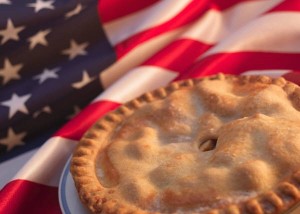Ahhhh…fireworks, family, picnics, barbeques. Fourth of July is upon us.
 And like any other holiday or special occasion, the risk of overeating increases proportionally to the amount of food available. In the past, I’ve written about how to prevent overeating during the holidays, but what do you do after you’ve overeaten anyway?
And like any other holiday or special occasion, the risk of overeating increases proportionally to the amount of food available. In the past, I’ve written about how to prevent overeating during the holidays, but what do you do after you’ve overeaten anyway?
What to Do When You Overdo It
Everybody overeats at times; that’s normal. The difference is that for some, an episode of overeating sets off a chain reaction: “I already blew it; I might as well keep eating. I’ll follow my diabetes meal plan tomorrow.” That’s your eat-repent-repeat cycle talking. When you have diabetes, overeating then under-eating wreaks havoc with your blood sugar.
How Mindfulness Helps
Mindfulness is simply awareness of the present moment. Mindful eating allows you to focus on the immediate effects of eating more than you needed, rather than beating yourself up over the potential long term consequences. That allows you to make adjustments and learn from the experience. If you’ve overeaten, here’s how to turn the episode into a learning experience instead of a downhill slide:
Notice how you feel. Sit quietly for a few moments and become completely aware of your body. Focus on the sensations so you’ll remember them the next time you’re tempted to overeat.
- Does your stomach feel full, stretched, or bloated?
- Is there any discomfort or pain?
- Do your clothes feel tight?
- Is there any nausea or heart burn?
- Do you feel short of breath?
- How is your energy level?
- Do you feel sleepy, sluggish, tired, or lethargic?
You may be less likely to repeat the mistake if you remind yourself how it feels to overeat (kind of takes the fun out of it, doesn’t it!).
Check your blood sugar. This information is helpful for learning about the effects of eating too much. Download a copy of our Fearless Blood Glucose Log and see what you can learn about the connections between what you eat, how you feel, and your blood sugars.
Don’t feel beat yourself up. It is normal to regretful when you feel uncomfortable and/or your blood sugar is above target as a result of overeating. But there is a big difference between guilt and regret! Guilt and shame only add to the problem and can lead to giving up. Regret leaves the door open for learning. Overeating doesn’t mean you were “bad.” It just means that you made a mistake-so don’t miss the lesson!
Turn your mistake into a learning experience. There are a lot of reasons people eat past the point of satisfaction: habits, learned behaviors, past dieting, and mindless eating. Ask yourself: “Why did it happen?” “What could I do differently next time?”
Don’t miss the lesson. Overeating on holidays and special occasions is just one of many examples we explore in chapter 17 of Eat What You Love, Love What You Eat with Diabetes. If you only give yourself permission to eat enjoyable foods on special occasions, you’re more likely to overeat them. You don’t need an excuse to have a wonderful meal-so why use a special occasion as an excuse to overeat? Next time, you could ask yourself, “If the occasion is so special, why would I want to ruin it by overeating and feeling uncomfortable?”
Wait to see when you feel physically hungry again. Rather than automatically eating your next scheduled sncak or meal by the clock, pay attention to your body. It may take a little longer for you to feel hungry again.
When you get hungry again, notice what you feel like eating. You might notice that you’re hungry for something smaller or something lighter-maybe a bowl of soup or cereal, a piece of fruit, or a salad. Gradually learn to trust and respect what your body tells you; as you become more mindful, you’ll naturally seek balance, variety, and moderation.
Last, don’t use exercise to punish yourself for overeating. Instead, take a walk, play with the kids, or choose other enjoyable physical activity to use the fuel you’ve consumed to live a full and satisfying life.
